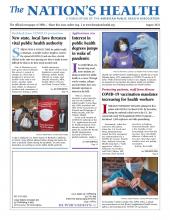COVID-19
In June, Knopf published “The Plague Year: America in the Time of COVID“ by Lawrence Wright. The book chronicles the oversights and repercussions of COVID-19 in the U.S. For more information, visit http://knopfdoubleday.com.
Mental health
Avid Reader Press and Simon & Schuster in June published “Group: How One Therapist and a Circle of Strangers Saved My Life” by Christie Tate. The memoir tells how a young lawyer finds human connection through group therapy. For more information, visit https://www.simonandschuster.com.
Food and environment
In June, Penguin Press published “We Are What We Eat: A Slow Food Manifesto,” by renowned American chef, restaurateur and activist Alice Waters. The book discusses “fast food values” and the ways food affects communities and the environment. For more information, visit https://www.penguinrandomhouse.com.
Public health advocacy
The World Federation of Public Health Associations in June released “Casebook on Advocacy in Public Health.” The free e-book is aimed at improving the capacity of public health associations to advocate and influence national public health policies. For more information, visit https://www.wfpha.org.
Sex and gender
In June, Springer published “Sexand Gender-Based Analysis in Public Health,” by Jacqueline Gahagan, PhD, and Mary Bryson, PhD. The textbook, designed for graduate students and public health practitioners, explores how sex and gender intersects with public health issues and analyzes the global movement toward sex- and gender-based health. For more information, visit https://link.springer.com.
Food and environment
In June, Johns Hopkins University Press published “Can Fixing Dinner Fix the Planet?” by Jessica Fanzo, PhD. The book is design to empower consumers, organizations and nations to make food-related changes to protect the environment. For more information, visit https://jhupbooks.press.jhu.edu.
Humanitarianism
In June, Stanford University Press published “Paradoxes of Care: Children and Global Medical Aid in Egypt” by Rania Kassab Sweis, PhD. The in-depth ethnographic study explores how medical aid organizations fail to address their stated aims and often maintain disparities in the lives of vulnerable children. For more information, visit https://www.sup.org.
- Copyright The Nation’s Health, American Public Health Association









